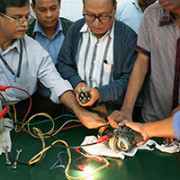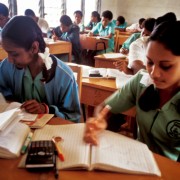Archive | Education RSS feed for this section
Education
 Education, Social development and protection
Education, Social development and protection
 Education, Regional cooperation and integration
Education, Regional cooperation and integration
 Education
Education
 Education
Education
 Education
Education
 Education
Education
 Education
Education
 Education
Education
 Education
Education

CET funding strategy for vulnerable workers

Research has demonstrated that in general, training has a positive impact on an individual’s labor market performance: wages grow faster after training, training has positive impact on employment security, and training increases the probability of re-employment after job loss. A recent adult skills survey released by the Organisation for Economic Co-operation and Development (OECD) in 2013 re-emphasized that adult learning or continuing education and training (CET) can play an important role in the development and maintenance of key information skills and the acquisition of other knowledge and skills that are necessary for keeping pace with the changing work environment.
Skills and good jobs

Education and skills are important policy levers for sustainable socioeconomic growth. With the right economic fundamentals, a highly educated population with the appropriate skills is a powerful tool for economies to move from the low-income to the middle-income status, or for those already in the middle-income category to avoid the middle-income trap and move to the high-income category. Skills shortages are a pressing issue as they limit the growth of output in the short term and limit the possibility for diversification and innovation in the long term.
Scholars, policymakers, and international affairs: Finding common cause

Any attempt to bridge the divide between scholars and policy-makers in international affairs is so welcome that I couldn’t help but applaud this book. The sad truth, however, is that after reading it I am even more convinced that the divide is a chasm.
Asia: The next higher education superpower?

In most higher education discourse today it is not unusual to hear the claim that the world’s center of gravity is shifting toward the East. Indeed, no region has undergone as profound a transformation as Asia during the past half-century, from the 1970s to the present. Unprecedented economic growth has driven major social and demographic change and institutional reform and, in most countries, has brought about greater stability. The advent of a large middle class, coupled with openness and market reforms driven by economic imperatives, has contributed to greater interconnectedness among Asian states and between them and the rest of the world.
Learning crisis in South Asia

South Asia is home to a growing youth population and widely considered to benefit from the “demographic dividend” in the coming decades. The United Nations Population Fund’s State of World Population 2014 report The Power of 1.8 Billion: Adolescents, Youth and the Transformation of the Future therefore calls for increased investment in youths and adolescents.
The challenges to internationalizing Japanese higher education

The Government of Japan plans to globalize Japanese higher education. One of its flagship programs wraped up in 2014 is the Global 30 initiative to invite 300,000 foreign students to Japan, i.e double the current numbers. Global 30 stresses that there is no initial requirement to know Japanese since “the best universities in Japan are now offering degree programs in English. By doing this, these universities have broken down the language barrier which was one of the obstacles preventing international students from studying in Japan.” The top global universities project which is the continuation of this effort will follow along the same lines.
Developing Myanmar’s knowledge economy: Improving higher education through international cooperation

Developing Myanmar’s knowledge economy is key to the country’s economic development. Higher education institutions will play a central role in training Myanmar’s workforce. Yet, a number of the academic programs lag behind international or ASEAN standards as universities have been virtually cut off from the outside world for decades.
Japan’s deglobalization

Around the world, students at the best universities are experiencing a more international upbringing than their parents. Japan, however, stands apart because of its continued seclusion. In particular, the decline of the number of Japanese students at leading United States (US) institutions is startling: In 1998–1999 there were 705 Japanese enrolled at three of the best US universities—Columbia, Harvard, and MIT—but this number had dropped to 339 by 2011–2012. Enrollment has also declined over the past seven years at Yale and UC-Berkeley. Overall, the figure of 46,872 Japanese studying in the US in 2000–2001 had dropped to 19,966 by 2011–2012. We also looked at doctoral candidates in several renowned, mostly US English-speaking universities in business, economics, and science.
The PRC must invest in education for sustained development

Among the many challenges facing the People’s Republic of China (PRC) in the coming decades, the most important is its need to massively expand its investment in education. In an age of unprecedented levels of globalization, successful development has meant for the PRC, as for other countries, passing through three phases: Phase 1, joining the regional and global supply chains and production networks; Phase 2, imitating and adapting; Phase 3, innovating. These phases need not be mutually exclusive and may overlap.
Reforming Asia’s Trade in Services will Help Human Development

The services sector is becoming increasingly important in modern economies. In many of the most developed economies, it can represent two–thirds or even three–quarters of all economic activity. Even in developing economies, the services sector often accounts for a significant share of economic output and employment. International trade in services is also increasing in importance, and has been growing more rapidly than goods trade over recent years. It has also proven to be more resilient to the global financial crisis and resulting trade collapse. It has long been recognized that services trade can influence economic and social outcomes through a variety of mechanisms.


Search
Subscribe / Connect to Asia Pathways
Subjects
- Agriculture and natural resources
- Blog
- Capacity development
- Climate change
- Economics
- Education
- Energy
- Environment
- Finance sector development
- Gender
- Governance and public sector management
- Health
- Industry and trade
- Information and Communications Technology
- Infrastructure
- Miscellaneous
- Population
- Poverty
- Private sector development
- Regional cooperation and integration
- Sanitation
- Social development and protection
- Transport
- Uncategorized
- Urban development
- Video Blog
- Water
Recent Posts
- Navigating Linear Transport Infrastructure Through Conservation Landscapes
- How Are Technology Trends Shaping the Future of Insurance?
- Securing Asia’s Future Through Soil Health: Why It Matters and What Must Be Done
- Silent Struggles: Advancing Women’s Mobility with Public Transportation in Asia
- Mind Your Neighbors: Measuring Shrimp Farm Spillovers




Recent Comments